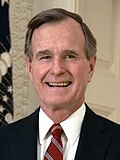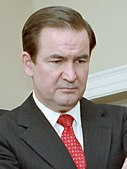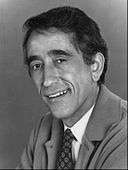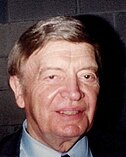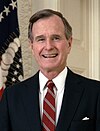
The 1996 United States presidential election was the 53rd quadrennial presidential election, held on Tuesday, November 5, 1996. Incumbent Democratic President Bill Clinton defeated former Senate Majority Leader Bob Dole, the Republican nominee, and Ross Perot, the Reform Party nominee and 1992 Independent presidential candidate.

The 1992 United States presidential election was the 52nd quadrennial presidential election, held on Tuesday, November 3, 1992. Democratic Governor Bill Clinton of Arkansas defeated incumbent Republican President George H. W. Bush and independent businessman Ross Perot of Texas. The election marked the end of a period of Republican dominance in American presidential politics that began in 1968, and also marked the end of 12 years of Republican rule of the White House, as well as the end of the Greatest Generation's 32-year American rule and the beginning of the baby boomers' 28-year dominance until 2020. It was the last time the incumbent president failed to win a second term until Donald Trump in 2020.

Henry Ross Perot Sr. was an American business magnate, politician, and philanthropist. He was the founder and chief executive officer of Electronic Data Systems and Perot Systems. He ran an independent campaign in the 1992 U.S. presidential election and a third-party campaign in the 1996 U.S. presidential election as the nominee of the Reform Party, which was formed by grassroots supporters of Perot's 1992 campaign. Although he failed to carry a single state in either election, both campaigns were the second and third strongest presidential showings by a third party or independent candidate in U.S. history.

The Reform Party of the United States of America (RPUSA), generally known as the Reform Party USA or the Reform Party, is a centrist political party in the United States, founded in 1995 by Ross Perot.

The New Hampshire presidential primary is the first in a series of nationwide party primary elections and the second party contest, the first being the Iowa caucuses, held in the United States every four years as part of the process of choosing the delegates to the Democratic and Republican national conventions which choose the party nominees for the presidential elections to be held in November. Although only a few delegates are chosen in the New Hampshire primary, its real importance comes from the massive media coverage it receives, along with the first caucus in Iowa.

From January 21 to June 3, 1980, voters of the Republican Party chose its nominee for president in the 1980 United States presidential election. Retired Hollywood actor and two-term California governor Ronald Reagan was selected as the nominee through a series of primary elections and caucuses culminating in the Republican National Convention held from July 14 to 17, 1980, in Detroit, Michigan.
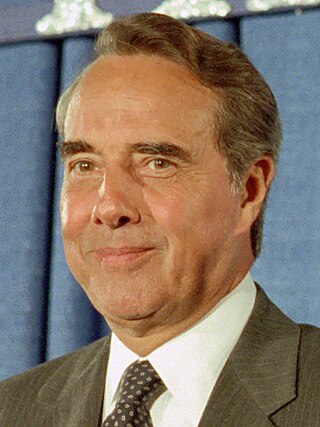
From January 14 to June 14, 1988, Republican voters chose their nominee for president in the 1988 United States presidential election. Incumbent Vice President George H. W. Bush was selected as the nominee through a series of primary elections and caucuses culminating in the 1988 Republican National Convention held from August 15 to August 18, 1988, in New Orleans, Louisiana.

From January 29 to June 4, 1996, voters of the Republican Party chose its nominee for president in the 1996 United States presidential election. Senator Bob Dole of Kansas, the former Senate majority leader, was selected as the nominee through a series of primary elections and caucuses culminating in the 1996 Republican National Convention held from August 12 to 15, 1996, in San Diego, California. Dole resigned from the Senate in June 1996 once he became the presumptive nominee to concentrate on his presidential campaign. He chose Jack Kemp as his running mate.
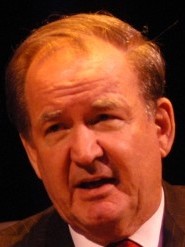
Following Ross Perot's impressive showing during the 1996 presidential election, the Reform Party of the United States of America became the country's largest third party. The party's 2000 presidential candidate would be entitled to $12.5 million in matching funds. Several high-profile candidates vied for the nomination, including Donald Trump, Pat Buchanan, and physicist John Hagelin. For a brief time, Congressman John B. Anderson and Congressman Ron Paul, who previously ran third party campaigns for President in 1980 and 1988 respectively, were considered potential candidates. Both Anderson and Paul ultimately declined to seek the nomination.
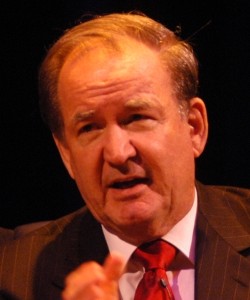
This is the electoral history of Pat Buchanan. Buchanan served as an advisor to three United States presidents: Richard Nixon, Gerald Ford, and Ronald Reagan. He then became a conservative columnist and co-hosted Crossfire, a political program on CNN.

The 2000 presidential campaign of Pat Buchanan, conservative pundit and advisor to both President Richard Nixon and Ronald Reagan, was formally launched on March 2, 1999, as Buchanan announced his intention to seek the Republican Party nomination for the presidency of the United States in the 2000 presidential election. It marked Buchanan's third primary campaign for the presidency, following his bids in 1992 and 1996. Although he had not attained the nomination either time, he had been regarded as a consequential figure within the party. Early primary surveys found Buchanan polling in the single digits, and following the publication of his book A Republic, Not an Empire, which generally advocated for noninterventionist and "America first" foreign policy, some within the Republican Party condemned Buchanan's foreign policy views. There began to be speculation that Buchanan would leave the Republican Party in favor of the Reform Party, a third party which qualified for matching federal campaign funds.

The 1992 United States elections elected state governors, the President of the United States, and members of the 103rd United States Congress. The election took place after the Soviet Union crumbled and the Cold War ended, as well as the redistricting that resulted from the 1990 census. Often considered "The Year Of The Woman," these elections brought an increased number of female politicians to Washington such as Dianne Feinstein (D-CA) and Carol Moseley Braun (D-IL). Governor Bill Clinton of Arkansas defeated incumbent President George H. W. Bush and businessman Ross Perot in the presidential election. The Democratic Party maintained their control of both chambers of Congress. This is the first Democratic trifecta since the Republican victory in the 1980 elections and the last one during the 20th century and the last one overall until 2008.
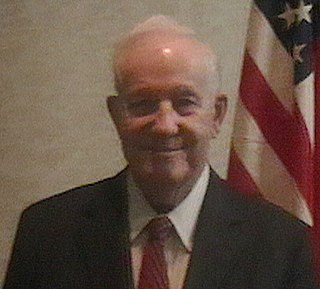
Lowell Jackson Fellure was an American perennial political candidate and engineer. He was the presidential nominee of the Prohibition Party for the 2012 presidential election.

The 1992 United States presidential election in Iowa took place on November 3, 1992, as part of the 1992 United States presidential election. Voters chose seven representatives, or electors to the Electoral College, who voted for president and vice president.

The 1992 United States presidential election in New Hampshire took place on November 3, 1992, as part of the 1992 United States presidential election. Voters chose four representatives, or electors to the Electoral College, who voted for president and vice president.
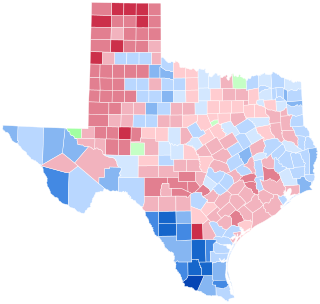
The 1992 United States presidential election in Texas took place on November 3, 1992, as part of the 1992 United States presidential election. Voters chose 32 representatives, or electors to the Electoral College, who voted for president and vice president.

The 1996 United States presidential election in New Hampshire took place on November 5, 1996, as part of the 1996 United States presidential election. Voters chose four representatives, or electors to the Electoral College, who voted for president and vice president.
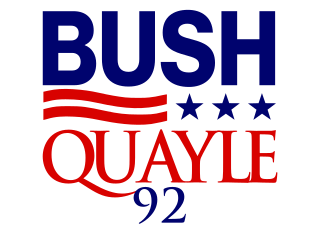
The 1992 presidential campaign of George H. W. Bush was an unsuccessful re-election campaign for 1992 United States presidential election by incumbent president George H. W. Bush, who had taken office on January 20, 1989. Bush and incumbent vice president Dan Quayle were defeated by Democratic presidential nominee Bill Clinton and vice presidential nominee Al Gore. Bush, a Republican president and former vice president under Ronald Reagan, launched his presidential bid on October 11, 1991, and secured nomination for his re-election on August 20, 1992. He was challenged in the Republican primaries by former White House Communications Director Pat Buchanan, who received less than one percent of the delegates in the Republican National Convention.

The 1992 presidential campaign of David Duke, a member of the Louisiana House of Representatives who had unsuccessfully sought the Democratic presidential nomination in 1980 presidential election and 1988 presidential election, was formally launched on December 4, 1991, as Duke announced his intention to seek the Republican Party nomination for the presidency of the United States in the 1992 presidential election.

